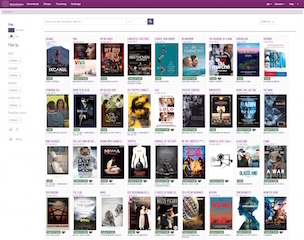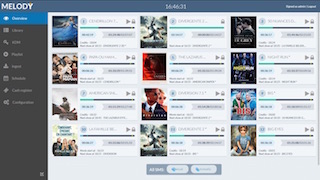 It is challenging to run a modern digital cinema theatre complex without theatre management software, which raises the question: who would want to? TMS has streamlined the exhibition business and opened the door to possibilities that were not even imagined more than a decade ago. With CinemaCon 2016 set to convene next month in Las Vegas one thing is certain: TMS will be a major topic at the show. To help readers stay abreast of the latest developments in Digital Cinema Report asked leading manufacturers what we can expect at the show. In part three of our ongoing series I spoke via email with Frédéric Verdière, product manager, Ymagis Group.
It is challenging to run a modern digital cinema theatre complex without theatre management software, which raises the question: who would want to? TMS has streamlined the exhibition business and opened the door to possibilities that were not even imagined more than a decade ago. With CinemaCon 2016 set to convene next month in Las Vegas one thing is certain: TMS will be a major topic at the show. To help readers stay abreast of the latest developments in Digital Cinema Report asked leading manufacturers what we can expect at the show. In part three of our ongoing series I spoke via email with Frédéric Verdière, product manager, Ymagis Group.
Digital Cinema Report: Briefly describe your company’s line of TMS products and services.
Frédéric Verdière: Ymagis Group’s software solutions for movie theaters are built around the company’s Melody TMS, which is an advanced solution for Theater Management. We’ve designed our exhibitor software solutions to optimize the daily management of theaters through advanced automation and interconnection between systems. Moreover, our products are designed to be as intuitive as possible. With their user-friendly interface, they can be used by everyone, even non-technical employees. We have also now incorporated our brand new digital signage solution, making it a completely integrated product to assist exhibitors in their day-to-day operations. In parallel, a few months ago we launched Orchestra, our all-in-one content management solution that can host various applications, including the TMS, content receiver and library management system, log management and digital signage. Orchestra helps provide the broadest range of services at the best price.
DCR: What are you highlighting at CinemaCon 2016?
FV: On the Ymagis Group booth 2819A in the Augustus Ballroom, we will not only be presenting our Melody TMS but also CineConductor, our content download platform for distributors and exhibitors. With CineConductor, exhibitors can browse our library of non-mainstream content to discover new programming opportunities, download DCPs directly to their DCI server via a secure broadband network and monitor their DCP download progress in real time. At the same time, distributors can push DCPs directly to cinemas’ servers via a secure broadband network, approve download requests and preload DCPs to cinemas which remain unrevealed to the exhibitors until a specific date set by the distributor.
 In other news, we will also introduce Symphony, the ultimate software solution to help connect, visualize and oversee a widespread group of cinema complexes from one central site. It allows users to save time by remotely scheduling all shows for their entire network of cinemas, directly from a single location. On-site cinema exhibitors will no longer need to waste precious time programming every week, Symphony takes care of that. They can create at will centralized playlists and schedules the booking department can use across all cinemas. Moreover, Symphony is a real-time monitoring interface that allows exhibitors to check that cinemas are running smoothly and help detect any potential errors. Thanks to its intuitive interface, Symphony is a powerful and user-friendly cinema circuit management software.
In other news, we will also introduce Symphony, the ultimate software solution to help connect, visualize and oversee a widespread group of cinema complexes from one central site. It allows users to save time by remotely scheduling all shows for their entire network of cinemas, directly from a single location. On-site cinema exhibitors will no longer need to waste precious time programming every week, Symphony takes care of that. They can create at will centralized playlists and schedules the booking department can use across all cinemas. Moreover, Symphony is a real-time monitoring interface that allows exhibitors to check that cinemas are running smoothly and help detect any potential errors. Thanks to its intuitive interface, Symphony is a powerful and user-friendly cinema circuit management software.
DCR: In your view, what have been the biggest developments in theatre management technology in the past decade?
FV: Digital projection has led to a dramatic change in the way theaters are managed. There are several aspects to this evolution: With a fully-featured TMS, theaters can complete the full automation of their projection system, allowing for staff reduction and a better cost structure. E-delivery allows better accessibility to content and significantly reduces operational costs for exhibitors and distributors alike. Thanks to improved content delivery solutions, cinemas are able to offer more diverse programming to their audiences. Digital signage will become increasingly important and will soon completely replace physical posters and advertising materials. It will offer clearer information, facilitate promotional actions and can create new opportunities for further interactivity with the audience.
DCR: Is there an opportunity in the market to provide a full suite of software and services including POS, TMS, and NOC Services? If so, what is your company doing in this area?
FV: It is a complex issue, as POS systems are usually very dependent upon local regulations in each country. That’s why providing a standardized software suite covering all aspects of exhibitors’ needs is not an obvious option in the short run. However, in the longer term, there will be greater expectations from the exhibition industry, especially for independent cinemas, to rely on fully-integrated solutions. We believe this evolution will take time and require more standardization than currently exists. We are working on providing further integrated solutions while maintaining the ability to connect them to third-party software tools.
DCR: Many exhibitors have told me that they would like to see software that can manage event cinema ticket sales. How does your company address this issue?
FV: Our Melody TMS is able to deal with special events in terms of scheduling. However, as we have not developed our own POS solution, we are not in a position today to address this need.
DCR: Along those lines, do you believe that cinema on demand in movie theatres is possible and, if so, what role can TMS play?
FV: The current results of cinema on demand initiatives are mitigated, as it’s a challenge to connect a specific audience for a specific content in a specific location and at a specific time. We believe that cinema on demand will require an evolution of the theater infrastructure to be successful. That said, our TMS is already able meet this demand, and we believe that our content delivery solution, CineConductor, could play a role in assisting those interested in this new booking concept.
